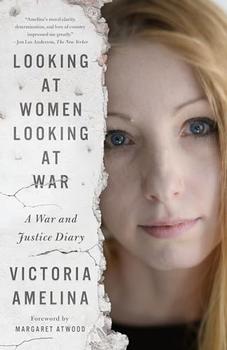Summary | Excerpt | Reviews | Beyond the book | Read-Alikes | Genres & Themes | Author Bio

A War and Justice Diary
by Victoria AmelinaVictoria Amelina was an award-winning novelist and children's author living in Kyiv. Like so many others, her life changed on February 24, 2022, when Russian bombs began falling on her country. Deciding that the role of novelist was irrelevant in wartime, she began a nonfiction account of her experiences during the conflict. The narrative began as a wartime diary chronicling her own transformation from offering shelter to refugees to investigating war crimes (see Beyond the Book for a history of the conflict). She felt, though, that the stories she truly wanted to tell were of the many remarkable women she met who were actively countering Russian aggression. Her story and theirs are woven together into Amelina's only nonfiction work, Looking at Women Looking at War.
The fact that the book made it to print at all is remarkable; it was only 60 percent complete when the author died during the summer of 2023 of injuries incurred in a Russian missile attack. Her husband and several friends decided the account was too important to lose and worked tirelessly assembling the fragments into something that could be published.
The result is unlike any narrative I've experienced—and I use the word "experienced" deliberately here. The book isn't an uninterrupted linear tale with a definable narrative arc. Instead, as Amelina travels more frequently to recently liberated zones within Ukraine, the text becomes ever more disjointed. Some pages contain nothing but disconnected, incomplete sentences ("impunity … helplessness of the … security council, France … tribunal-open for talk; ICC doesn't support that … radbez"). Some chapters contain a title but no other content. Repetition is common and individuals and events are introduced without context. The effect is astonishing; Amelina's work comes across as raw and immediate—a work in progress that will never be finished. It felt not so much like reading a book as uncovering an ancient manuscript one must decipher. Although the author doesn't pack a lot of emotion into the text, it nevertheless prompts a visceral reaction.
That's not to say all of the book is fragmentary; its early sections are more complete and relay the author's reactions to events as they occur. She was with her 10-year-old son on vacation in Egypt on February 24, for example, unable to fly home to Ukraine. She writes of the experience:
"How does it feel to be stuck in an empty airport in a foreign country, knowing that the ruthless enemy is attacking the cities you love? I feel a mixture of fury, grief, and … relief. Yes, I also feel relieved. It seems shameful yet inescapable to feel this way, and I justify myself by thinking I'm not the only writer who has met the beginning of an apocalyptic war with something other than despair or anger."
The stories of the women she meets feel more distant. I can't help but wonder if their lives would have been more fleshed out had Amelina more time to do so. Still, she vividly portrays the actions these individuals take as their country falls apart. One woman stockpiles supplies in her basement and makes sure her children and grandchildren are safe before heading to the front lines to tend to the wounded. A children's writer reads urgent announcements at the railway station because she can translate the announcements into other languages on the fly. A human rights lawyer decides to join the army because she can shoot so well. Amelina describes these women and many others who take small actions that impact the well-being of others in an untenable situation.
Looking at Women Looking at War is a must-read for anyone seeking to understand what it's like to have a war raging in your country, or for those interested in the Russia-Ukraine War in particular. But readers need to approach the book with the understanding that it's an unusual and at times challenging read, due largely to its format. Those approaching it with expectations of a moving book about wartime or one that lays out the conflict's history may be disappointed. Readers who persist, though, will almost certainly find Amelina's work unforgettable.
![]() This review
first ran in the February 26, 2025
issue of BookBrowse Recommends.
This review
first ran in the February 26, 2025
issue of BookBrowse Recommends.

If you liked Looking at Women Looking at War, try these:

by Maria Reva
Published 2025
Set in Ukraine, an eccentric scientist breeding rare snails crosses paths with sisters posing as members of the marriage industry to find their activist mother. As Russia invades, they embark on a wild journey with kidnapped bachelors and a last-of-its-kind snail. This darkly comic novel explores survival, love, and the impact of war.

by Suzanne Cope
Published 2025
The gripping, true, and untold history of the Italian anti-fascist resistance during World War II, told through the stories of four spectacularly courageous women fighters.
Music is the pleasure the human mind experiences from counting without being aware that it is counting
Click Here to find out who said this, as well as discovering other famous literary quotes!
Your guide toexceptional books
BookBrowse seeks out and recommends the best in contemporary fiction and nonfiction—books that not only engage and entertain but also deepen our understanding of ourselves and the world around us.